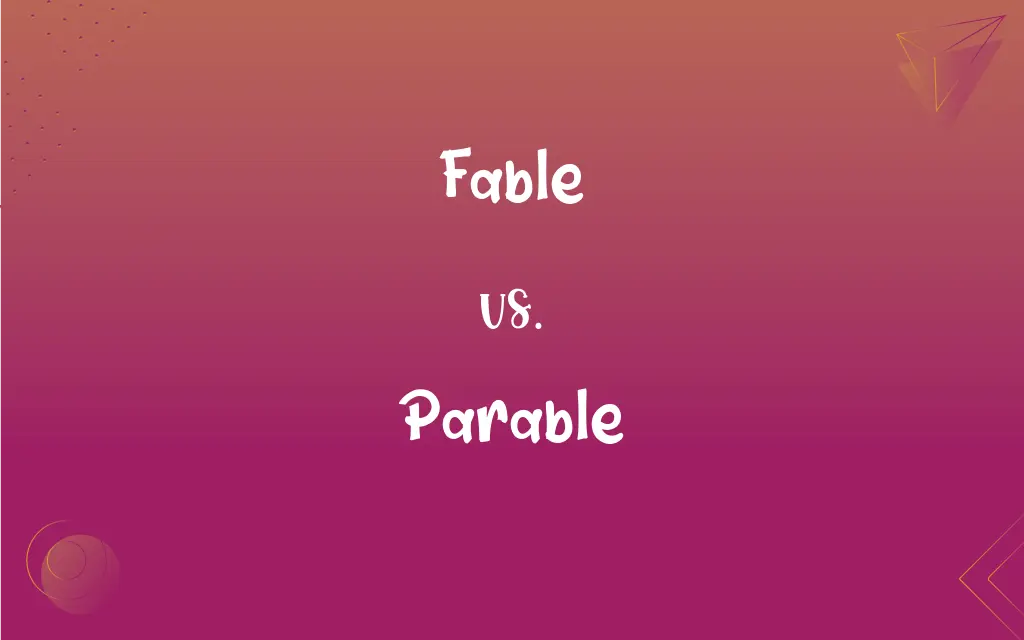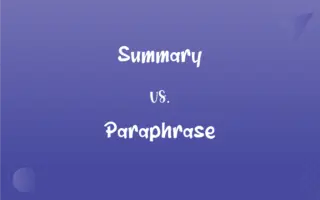Fable vs. Parable: What's the Difference?
Edited by Aimie Carlson || By Janet White || Updated on November 9, 2023
A "Fable" is a short story, typically with animals as characters, conveying a moral, while a "Parable" is a simple story used to illustrate a moral or spiritual lesson, as told by Jesus in the Gospels.

Key Differences
"Fable" is a literary genre: a succinct fictional story that features animals, mythical creatures, plants, inanimate objects, or forces of nature which are anthropomorphized, and that illustrates a moral lesson (a "moral"), which may at the end be expressed explicitly in a pithy maxim. A "Parable," however, is a short allegorical story designed to illustrate or teach some truth, religious principle, or moral lesson.
A "Fable" often involves animals with human qualities solving problems, usually ending with a moral lesson. Conversely, a "Parable" is a brief narrative that teaches a moral, but unlike fables, parables are composed of human characters in real-life situations.
The term "Fable" is derived from the Latin word "fabula" meaning “story” or “play,” whereas "Parable" comes from the Greek word "parabolē," which means “comparison” or “analogy.”
A "Fable" operates on two levels: the characters and the story represent specific qualities or events, and there's a direct moral lesson to be learned. In contrast, a "Parable" also operates symbolically but is often more complex, typically requiring interpretation and not always providing a straightforward moral lesson.
"Fables" are universal, used in cultures around the world, often as children's literature, to teach moral lessons. "Parables," however, are commonly found in Christian texts, particularly in the Gospels of the New Testament, used by Jesus to teach moral and spiritual lessons.
ADVERTISEMENT
Comparison Chart
Characters
Animals, mythical creatures, or inanimate objects
Humans
Teaching
Direct moral lesson
Requires interpretation
Origin of Term
Latin "fabula"
Greek "parabolē"
Cultural Context
Universal
Predominantly Christian
Complexity
Simple with direct moral
Often more complex, allegorical
ADVERTISEMENT
Fable and Parable Definitions
Fable
A story that embodies a lesson often illustrated by characters who are animals.
The fable of the lion and the mouse shows that no act of kindness is ever wasted.
Parable
An earthly story with a heavenly meaning.
Through the parable of the sower, listeners learn about the different receptions of the Gospel.
Fable
A short story usually with animals as characters that conveys a moral.
The Fox and the Grapes is a well-known fable.
Parable
A figure of speech, which presents a short story, typically with a moral lesson at the end.
The parable of the lost son conveys the theme of forgiveness.
Fable
A fictional story meant to teach a lesson, often involving mythical forces.
His favorite fable involved a troll under a bridge.
Parable
A short allegorical story that teaches a truth or lesson.
He spoke in parables, making his lessons relatable to everyday life.
Fable
Literature in which animals speak and act like humans to convey a moral.
In the fable, the rabbit raced the turtle and lost.
Parable
A simple story used to illustrate a moral or spiritual lesson.
The Good Samaritan is a famous parable from the Bible.
Fable
A usually short narrative making an edifying or cautionary point and often employing as characters animals that speak and act like humans.
Parable
A succinct story that illustrates a moral principle through analogy.
The parable of the mustard seed emphasizes faith.
Fable
A story about legendary persons and exploits.
Parable
A simple story illustrating a moral or religious lesson.
Fable
A falsehood; a lie.
Parable
A short narrative illustrating a lesson (usually religious/moral) by comparison or analogy.
In the New Testament the parables told by Jesus Christ convey His message, as in "The parable of the prodigal son".
Catholic sermons normally draw on at least one Biblical lecture, often parables.
Fable
To recount as if true.
Parable
(transitive) To represent by parable.
Fable
To compose fables.
Parable
(obsolete) That can easily be prepared or procured; obtainable.
Fable
A fictitious narrative intended to enforce some useful truth or precept, usually with animals, etc. as characters; an apologue. Prototypically, Aesop's Fables.
Parable
Procurable.
Fable
Any story told to excite wonder; common talk; the theme of talk.
Parable
A comparison; a similitude; specifically, a short fictitious narrative of something which might really occur in life or nature, by means of which a moral is drawn; as, the parables of Christ.
Declare unto us the parable of the tares.
Fable
Fiction; untruth; falsehood.
Parable
To represent by parable.
Which by the ancient sages was thus parabled.
Fable
The plot, story, or connected series of events forming the subject of an epic or dramatic poem.
Parable
A short moral story (often with animal characters)
Fable
To compose fables; hence, to write or speak fiction; to write or utter what is not true.
Parable
(New Testament) any of the stories told by Jesus to convey his religious message;
The parable of the prodigal son
Fable
To make up; to devise, and speak of, as true or real; to tell of falsely; to recount in the form of a fable.
Fable
A Feigned story or tale, intended to instruct or amuse; a fictitious narration intended to enforce some useful truth or precept; an apologue. See the Note under Apologue.
Jotham's fable of the trees is the oldest extant.
Fable
The plot, story, or connected series of events, forming the subject of an epic or dramatic poem.
The moral is the first business of the poet; this being formed, he contrives such a design or fable as may be most suitable to the moral.
Fable
Any story told to excite wonder; common talk; the theme of talk.
We grewThe fable of the city where we dwelt.
Fable
Fiction; untruth; falsehood.
It would look like a fable to report that this gentleman gives away a great fortune by secret methods.
Fable
To compose fables; hence, to write or speak fiction ; to write or utter what is not true.
Vain now the tales which fabling poets tell.
He fables, yet speaks truth.
Fable
To feign; to invent; to devise, and speak of, as true or real; to tell of falsely.
The hell thou fablest.
Fable
A deliberately false or improbable account
Fable
A short moral story (often with animal characters)
Fable
A story about mythical or supernatural beings or events
Fable
A narration intended to enforce a useful truth.
Fables often include stories where the cunning outwit the strong.
FAQs
Are parables exclusive to Christian texts?
They're prominent in Christianity but also appear in other religious and philosophical traditions.
Are the morals in fables and parables always explicitly stated?
In fables, morals are often explicit, while parables usually require interpretation.
Do fables only feature animal characters?
Primarily, though they can also include plants, inanimate objects, and mythical creatures.
Can fables have human characters?
Rarely. Fables typically feature non-human characters to convey morals.
Why do parables use human characters?
To make the story relatable and the lesson applicable to human behavior or conditions.
Do parables always have a religious undertone?
Often, but they can also teach secular moral lessons.
What's the main purpose of a fable?
To impart a lesson or moral through clear, simple storytelling.
Can a story be both a fable and a parable?
Generally, they're distinct, but a story could potentially be interpreted both ways.
Are animals in fables symbolic?
Yes, they usually symbolize human vices and virtues.
What makes parables effective teaching tools?
Their use of familiar situations and human characters for relatable lessons.
Are parables purely fictional?
They're fictional but are used to illustrate real-life moral or spiritual lessons.
Are fables suitable for children?
Yes, they're often used as simple, instructive stories for children.
Can fables be for adults?
Yes, while simple, fables can provide insights for all ages.
Are parables meant to be interpreted literally?
They're meant for deeper interpretation beyond the literal story.
Do fables have a long literary history?
Yes, they've been part of storytelling cultures worldwide for centuries.
Can fables originate from folklore?
Yes, many fables have origins in traditional folk stories.
How are the lessons in fables conveyed?
Through the actions and consequences faced by the characters.
How do parables relate to cultural contexts?
They often use culturally relevant stories to impart broader truths or lessons.
Are modern stories considered fables?
Some modern stories with clear morals and symbolic characters can be considered fables.
Do all parables have happy endings?
Not always. The outcome is designed to reinforce the lesson, not necessarily to please.
About Author
Written by
Janet WhiteJanet White has been an esteemed writer and blogger for Difference Wiki. Holding a Master's degree in Science and Medical Journalism from the prestigious Boston University, she has consistently demonstrated her expertise and passion for her field. When she's not immersed in her work, Janet relishes her time exercising, delving into a good book, and cherishing moments with friends and family.
Edited by
Aimie CarlsonAimie Carlson, holding a master's degree in English literature, is a fervent English language enthusiast. She lends her writing talents to Difference Wiki, a prominent website that specializes in comparisons, offering readers insightful analyses that both captivate and inform.































































